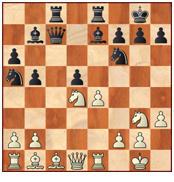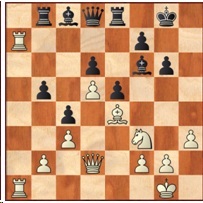“Good judgement comes with experience. Experience comes from bad judgement.” – Tony Robbins
A lot of the people I know suffer a lot when they lose a chess game. Especially younger guys, though I once had the pleasure of being insulted by an old guy rated 600 points lower than I, after I surprisingly prevailed in 22 moves.
I used to be a poor loser myself. Not a poor loser like Korchnoi, who fantasizes throughout the game about insulting the opponent after it (despite the result), but the introvert unhappy loser to whom a loss is a sort of autoimmune disease.
But at some point along the way I realised what could be called the problem with failure: It had no beneficiary effect on me.
Actually I never looked at it like this before, I just reacted to the chemical reaction of emotions in my body, believing that it was real and that it was as important as it felt. It was only later, when I got seriously fed up with feeling awful about a game I love, that I started thinking about function.
But before we go there, we need to ask ourselves: what is failure actually. Is it a result below expectations? And if so, then who’s? Is it the feeling we get when we lose? And if so, then why do we get this feeling?
At first I did not have a clear answer to any of these questions. I just knew I had to rethink my reaction to “failure”. I also had no idea what the benefits of failure were supposed to be. Now I would probably talk about a wiring in the brain left over from the caveman, which has little to do with chess. But the cables are still there and we have not yet learned to produce new ones.
So, at some point I decided to change the rules. I wanted them to work in a way that made sense to me.
I decided that I would only be unhappy with my play if my effort at the board was not up to scratch. I would no longer be a victim to whether or not the opponent had a good day. I would not kick myself for not having done work that I had not done after last time I struggled with the same issue, because feeling bad about it the last time had not worked, in the sense that I had not done the work subsequently.
As a result, I did not mind when I missed winning two pawns in a blitz play-off for the Danish Championship 2006 (against Steffen Pedersen), even though losing this game left me 6th rather than 1st in the bizarre (but entertaining) gladiator system. Actually some guys were really shocked with the indifference I took the loss, but to me it was far from indifference. I was actually a happy loser!
Obviously I was not happy to lose and I had fought hard against it all the way. Actually I had recovered from a 0/3 start to play for the championship in the last round. There was no indication that approaching chess from a positive standpoint was damaging to my results. Actually, the following year was my best year in chess: I beat some great players, won a few nice events and surpassed 2500, the final need for the GM-title.
Later on when I worked with Sabino Brunello, we talked a lot about this. Sabino used to be devastated by defeats. Actually it was so bad that if he failed to solve an easy exercise, he would feel worthless.
I did not believe that it was working for him. Because the only possible function with feeling like this would be if it improved his game. It really did not.
Over the six years we worked together he transformed entirely as a person. Obviously he matured just by growing up, but I think our discussions about mental approach helped a lot too. These days he seems happy when he loses and even happier when he wins!
Is it working? Check out the C-group of Wijk Aan Zee this year and judge for yourself.
Conclusion:
If you beat yourself up when the results do not go in your direction and it does not motivate you to work harder, probably you will find what I had found: What you can do with anger and pain, you might be able to do at least as well with joy and harmony.
Personally I have the rule that if I feel I let myself down; then I am allowed to be angry. But after I started trusting myself to do my best, I often did. There have of course been times when I played below my level. But trusting that I am on my own side, I am no longer angry with myself or have other negative emotions. I just try to find out why I made the mistakes. Even when I lost in 12 moves (!) with White a few weeks ago I did not feel especially bad. I simply realised that I was not ready to play such a morning round and that I should not put any value to this game. Besides, I am retired 😎 .


Recent Comments